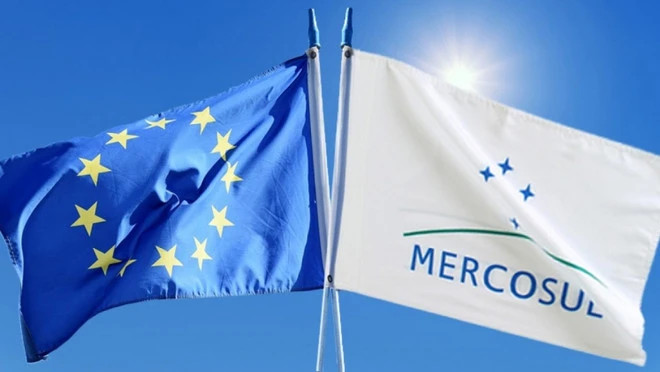European farmers are worried that their products will become less competitive due to the influx of agricultural products from South America, and they are outraged by what they consider as “less stringent” regulations within the agreement.
The EU-Mercosur agreement creates a vast free trade area with over 700 million people, including the EU and Brazil, Argentina, Uruguay, Paraguay, and Bolivia. It is considered one of the largest trade agreements in the world, expanding economic opportunities for both sides.
Although negotiations have been completed, the EU-Mercosur agreement still needs approval from at least 15 of the 27 EU member states, representing at least 65% of the EU's population.
However, the agreement is causing internal divisions within the EU and is facing harsh criticism from farmers in many countries.
The agreement, described by European Commission President Ursula von der Leyen as a “win-win agreement”, is strongly opposed by France. While Germany, Spain, Portugal, and other countries have welcomed the agreement, France, backed by Italy and Poland, has declared that it cannot accept the agreement in its current form.
France strongly criticises the agreement due to concerns about its negative impact on the domestic agricultural sector. French producers warn that the importation of cheap beef and poultry from South America will put significant pressure on the domestic market, affecting the livelihoods of farmers. French President Emmanuel Macron declared: “Our farmers cannot become adjustment tools for purchasing power or for trade agreements.”
Poland, Austria, and Ireland have also expressed concerns about environmental issues and domestic economic interests. Meanwhile, European farmers criticise the agricultural sector in South America for its role in the large-scale deforestation of the Amazon — a critical buffer against climate change.
Recently, the Agrarian Chamber of the Czech Republic and the Agricultural Union of the Czech Republic announced that Czech farmers will participate in pan-European protests starting from February 27 to oppose the importation of food from outside the EU, particularly in the context of the EU-Mercosur trade agreement.
They argue that the agreement will create an unfair playing field and unhealthy competition for EU agricultural products, as farmers in South American countries do not have to adhere to the same stringent standards as those in the EU.
The trade agreement between the EU and South American countries will increase imports of sugar, beef, or poultry, potentially lowering prices in the European market and making local farmers less competitive. Czech farmers demand the cancellation of the agreement to protect the market and ensure a fair playing field for businesses in the European market.
The EU-Mercosur agreement is not just a trade pact but also symbolic of cooperation between the Northern and Southern hemispheres. In the context of increasing global economic and geopolitical competition, the agreement is expected to strengthen the position of the EU and Mercosur countries internationally.
The European Commission President emphasises that the agreement is not only economically beneficial but also strategically important politically.
Germany, which has been driving the agreement for years, sees this as an opportunity to expand export markets, as Europe's largest economy struggles with slow growth.
Although political consensus has been reached, the process of implementing the EU-Mercosur trade agreement faces many challenges. The document must undergo legal scrutiny and approval by EU member states.
French President Macron has announced that he will continue to rally an alliance against the agreement. However, to block it entirely, France still needs support from other key countries.
The strong internal divisions within the EU and opposition from the agricultural sector continue to be obstacles to the trade agreement and the goal of expanding cooperation between the two regions.
















